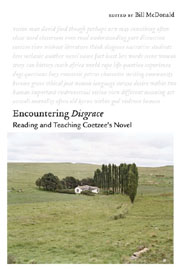Book contents
- Frontmatter
- Contents
- Acknowledgments
- Introduction
- I Reading Disgrace
- 1 “We are not asked to condemn”: Sympathy, Subjectivity, and the Narration of Disgrace
- 2 Beyond Sympathy: A Bakhtinian Reading of Disgrace
- 3 “Is it too late to educate the eye?”: David Lurie, Richard of St. Victor, and “vision as eros” in Disgrace
- 4 Disgrace and the Neighbor: An Interchange with Bill McDonald
- 5 To Live as Dogs or Pigs Live Under Us: Accepting What's on Offer in Disgrace
- 6 Tenuous Arrangements: The Ethics of Rape in Disgrace
- 7 Dis(g)race, or White Man Writing
- 8 Clerk in a Post-Religious Age: Reading Lurie's Remnant Romantic Temperament in Disgrace
- 9 Saying it Right in Disgrace: David Lurie, Faust, and the Romantic Conception of Language
- 10 The Dispossession of David Lurie
- II Reading Disgrace with Others
- Works Cited
- Notes on the Contributors
- Index
6 - Tenuous Arrangements: The Ethics of Rape in Disgrace
from I - Reading Disgrace
Published online by Cambridge University Press: 12 September 2012
- Frontmatter
- Contents
- Acknowledgments
- Introduction
- I Reading Disgrace
- 1 “We are not asked to condemn”: Sympathy, Subjectivity, and the Narration of Disgrace
- 2 Beyond Sympathy: A Bakhtinian Reading of Disgrace
- 3 “Is it too late to educate the eye?”: David Lurie, Richard of St. Victor, and “vision as eros” in Disgrace
- 4 Disgrace and the Neighbor: An Interchange with Bill McDonald
- 5 To Live as Dogs or Pigs Live Under Us: Accepting What's on Offer in Disgrace
- 6 Tenuous Arrangements: The Ethics of Rape in Disgrace
- 7 Dis(g)race, or White Man Writing
- 8 Clerk in a Post-Religious Age: Reading Lurie's Remnant Romantic Temperament in Disgrace
- 9 Saying it Right in Disgrace: David Lurie, Faust, and the Romantic Conception of Language
- 10 The Dispossession of David Lurie
- II Reading Disgrace with Others
- Works Cited
- Notes on the Contributors
- Index
Summary
For teachers concerned with the ethics of the classroom, the moderation of a discussion about rape activates an array of concerns. Disgrace — with its representation of an unethical teacher-student relationship, an acquaintance rape, a problematic father-daughter dynamic, and a violent and racist rape scene — seems bound to provoke charged responses from contemporary college students. At two different colleges, we read the novel with two very different sets of students. In Kim's class at the College of Saint Rose in Albany, New York, for example, after the first day of discussion, a student refused to return to class until the group had finished the novel. Julie participated fully in Bill McDonald and Matt Gray's “Coetzee” seminar in the Johnston Center, where students negotiated to read Disgrace at the beginning and again at the end of the semester. Some responses bridged the geographic divide between the two classes. On the subject of Melanie's relationship with David, for example, some students condemned her actions while others fiercely defended her; some judged David Lurie for his interactions while others sympathized. All of the students were appalled by Lucy's rape. None was able to fully articulate a defense of her refusal to file a police report or her willingness stay on the land and marry Petrus.
As feminist readers and teachers, we felt unmoored, and this essay traces our collaborative work toward a reading of rape in Disgrace. While the two of us had met briefly in the summer of 2006, we were virtual strangers to one another when we accepted the task of co-authoring this essay on rape in Disgrace.
- Type
- Chapter
- Information
- Encountering 'Disgrace'Reading and Teaching Coetzee's Novel, pp. 116 - 137Publisher: Boydell & BrewerPrint publication year: 2009

